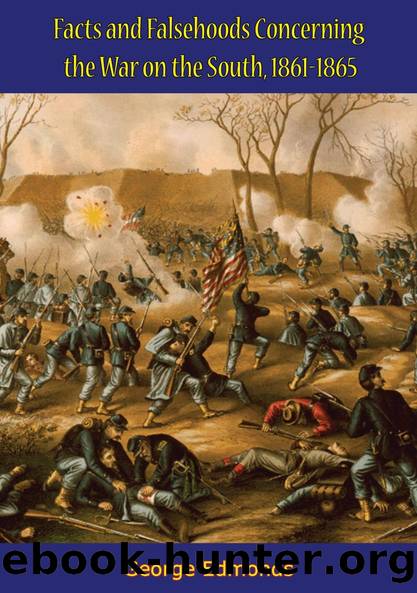Facts and Falsehoods Concerning the War on the South, 1861-1865 by George Edmonds

Author:George Edmonds [Edmonds, George]
Language: eng
Format: epub
ISBN: 9781297027321
Google: gDtLrgEACAAJ
Publisher: Scholar's Choice
Published: 2015-02-15T03:04:54+00:00
CHAPTER XXI.
Save the Union, Free Slaves the Pretext, Not the Purpose, of the War on the South. Real Cause, Hatred of Democracy.
Mr. A. K. Fisk, a distinguished Republican, throws some light on the relationship of the two parties, Hamiltonâs and Jeffersonâs; in other words, the party favoring Monarchy and the party favoring Democracy, the rule of the people.
âHamilton and Jefferson,â says Fisk in the North American Review of April, 1879, page 410, ârepresent the two opposing ideas which prevailed at the time our Government was formed, and which, with some variations, have been the basis of our political divisions into parties ever since, and have been involved in all the contests and controversies in our constitutional career. Hamilton embodied the tendency to a centralization of power in the national Government. There is no doubt that he would have preferred a monarchy. Jefferson, on the other hand, represented the demand for a complete diffusion of sovereignty among the people, and its exercise locally and in the States, and the confining of national functions as closely as possible under the most restrictive interpretation of the Constitution.â
Mr. Fisk admits that Hamilton, the monarchist, represented the party which opposed the sovereignty of the people, A writer in the St. Louis Globe-Democrat, a staunch advocate of Hamiltonâs strong government doctrines, in that paper, March 6, 1898, made this significant comment:
âThe resemblance between Hamilton and Lincoln is so close no one can resist it Hamilton is dwarfed by no man. A just parallel of Hamilton and Lincoln will show them alike in many ways. They were alike almost to the point of identity. Hamiltonâs work made Lincolnâs possible.â
Hamiltonâs monarchic principles certainly made Lincolnâs work possible. Lincoln put in practice what Hamilton had advocated. Hamilton made no concealment of his monarchic principles; he preferred a monarchy such as England has, but failing that he wanted a President for life and the Governors of States appointed by the President. Until seated in the White House, Lincoln talked Democracy and affected great esteem for Jeffersonâs Democratic principles.
As soon as he held in his grip the machinery of government, he schemed for absolute power, and as soon as he was commander in chief of nearly 3,000,000 armed men, no imperial despot in pagan time ever wielded more autocratic power than did Abraham Lincoln, and Republican writers of today are so imbued with imperialism they laud and glorify Lincoln for his usurpation of power.
Although well informed Republicans know that the war on the South was waged neither to save the Union nor to free slaves, it does not suit that party to be candid on this subject Now and then, however, some Republican forgets the partyâs policy of secrecy and tells the truth. That boldly imperialistic Republican journal, the Globe-Democrat, of St. Louis, in its issue of April 9, 1900, had an article which uncovers facts, even to the foundation stones, on which rested the war of the 60âs. Consider the following:
âLincoln, Grant and the Union armies gave a victory to Hamiltonism (Monarchy) when it subjugated the Confederates (Democrats) in the South.
Download
This site does not store any files on its server. We only index and link to content provided by other sites. Please contact the content providers to delete copyright contents if any and email us, we'll remove relevant links or contents immediately.
| United States | Abolition |
| Campaigns & Battlefields | Confederacy |
| Naval Operations | Regimental Histories |
| Women |
In Cold Blood by Truman Capote(2702)
Steve Jobs by Walter Isaacson(2459)
All the President's Men by Carl Bernstein & Bob Woodward(1972)
Lonely Planet New York City by Lonely Planet(1857)
The Murder of Marilyn Monroe by Jay Margolis(1752)
The Room Where It Happened by John Bolton;(1729)
The Poisoner's Handbook by Deborah Blum(1671)
And the Band Played On by Randy Shilts(1632)
Lincoln by David Herbert Donald(1622)
The Innovators by Walter Isaacson(1612)
A Colony in a Nation by Chris Hayes(1530)
The Innovators: How a Group of Hackers, Geniuses, and Geeks Created the Digital Revolution by Walter Isaacson(1519)
Under the Banner of Heaven: A Story of Violent Faith by Jon Krakauer(1425)
The Unsettlers by Mark Sundeen(1347)
Amelia Earhart by Doris L. Rich(1346)
Birdmen by Lawrence Goldstone(1346)
Decision Points by George W. Bush(1261)
Dirt by Bill Buford(1247)
Zeitoun by Dave Eggers(1231)
